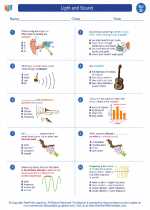Behavior
Behavior refers to the actions and reactions of an organism in response to its environment or to the actions of other organisms. It is an important aspect of the study of living organisms and can be influenced by a variety of factors including genetics, learning, and environmental stimuli.
Types of Behavior
There are several types of behavior exhibited by living organisms:
- Instinctive Behavior: This type of behavior is innate and is performed without any prior experience or learning. It is often genetically determined and is seen in many animal species.
- Learned Behavior: Some behaviors are acquired through experience and learning. This type of behavior can be modified based on the individual's experiences.
- Social Behavior: Many organisms exhibit behavior that is influenced by interactions with other members of their species. This can include cooperation, competition, and communication.
- Territorial Behavior: Some organisms exhibit behavior related to defending or establishing a territory. This can help in obtaining resources and mates.
- Migratory Behavior: Certain species exhibit behavior related to seasonal migration, often in search of food, better climate, or breeding grounds.
Factors Influencing Behavior
Behavior can be influenced by various factors:
- Genetics: Some behaviors have a genetic basis and are inherited from parents.
- Environment: The environment in which an organism lives can have a significant impact on its behavior. Factors such as food availability, temperature, and presence of predators can all influence behavior.
- Learning and Experience: Many behaviors are learned through experience and can be modified based on individual experiences.
- Hormones: Chemical messengers in the body can also play a role in influencing behavior, especially in the case of mating, aggression, and parental care.
Study Guide
Here are some key points to focus on when studying behavior:
- Understand the different types of behavior and be able to provide examples of each.
- Identify and explain the factors that can influence behavior in living organisms.
- Explore the role of genetics, learning, and environmental stimuli in shaping behavior.
- Consider the evolutionary significance of certain behaviors and how they contribute to an organism's survival and reproduction.
- Examine the similarities and differences in behavior across different species and how they are adapted to their specific environments.
By grasping these key points, you will have a solid understanding of the topic of behavior and its significance in the study of living organisms.
.◂Science Worksheets and Study Guides Fourth Grade. Light and Sound
Study Guide Light and sound
Light and sound  Worksheet/Answer key
Worksheet/Answer key Light and sound
Light and sound  Worksheet/Answer key
Worksheet/Answer key Light and sound
Light and sound  Worksheet/Answer key
Worksheet/Answer key Light and sound
Light and sound  Vocabulary/Answer key
Vocabulary/Answer key Light and sound
Light and sound  Vocabulary/Answer key
Vocabulary/Answer key Light and sound
Light and sound  Vocabulary/Answer key
Vocabulary/Answer key Light and sound
Light and sound 

 Worksheet/Answer key
Worksheet/Answer key
 Worksheet/Answer key
Worksheet/Answer key
 Worksheet/Answer key
Worksheet/Answer key
 Vocabulary/Answer key
Vocabulary/Answer key
 Vocabulary/Answer key
Vocabulary/Answer key
 Vocabulary/Answer key
Vocabulary/Answer key

The resources above cover the following skills:
PHYSICAL SCIENCE (NGSS)
Waves and their Applications in Technologies for Information Transfer
Students who demonstrate understanding can:
Develop a model of waves to describe patterns in terms of amplitude and wavelength and that waves can cause objects to move.